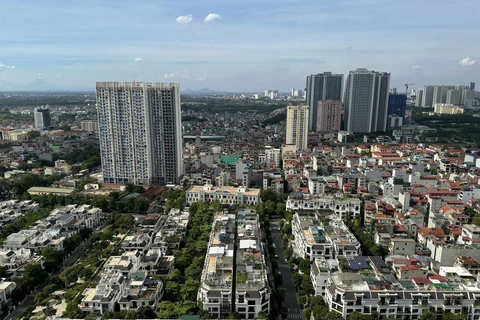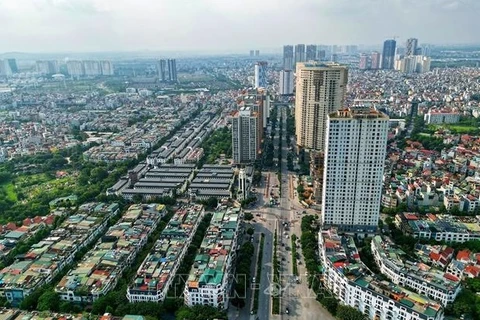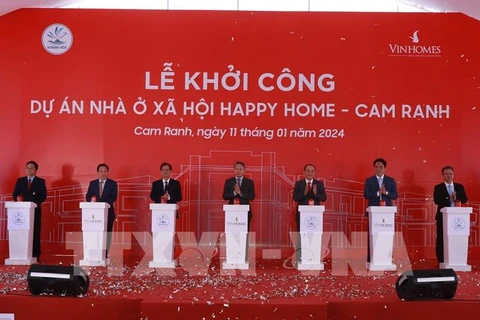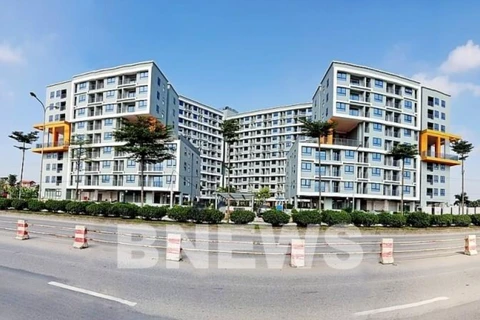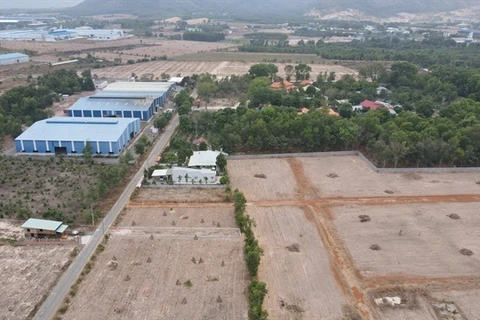Hanoi (VNA) – In a bid to effectively carry out the project to build at least 1 million social housing units for low-income earners and workers in industrial parks in the 2021 - 2030 period, the Ministry of Construction (MoC) said on February 19 that efforts will be made to complete 130,000 apartments nationwide in 2024 as targeted by the Government in Resolution No. 01/NQ-CP, dated January 5 this year.
1,249 land lots planned for social housing development
In its latest report submitted to the Prime Minister, the MoC said that thanks to the National Assembly’s ratification of the revised Housing Law, the revised Law on Real Estate Business, the revised Land Law, and the revised Law on Credit Institutions, there are now many mechanisms and policies for tackling difficulties and increasing support to facilitate the development of social housing. Specific policies have also been issued to boost the building of accommodation for workers in industrial parks and members of the armed forces.
It cited localities as reporting that 1,249 land lots covering 8,390ha have been zoned off for building social housing nationwide. The area has expanded by more than 5,000ha compared to the 3,359ha recorded in 2019.
Many localities have zoned off land for the work, including Dong Nai province 1,063ha, Ho Chi Minh City 608ha, Long An province 577ha, Hai Phong city 471ha, and Hanoi 412ha.
However, some others haven’t, including the provinces of Ninh Binh, Ha Giang, Lai Chau, Nghe An, Dak Nong, Ninh Thuan, and Dong Thap, the MoC said.
Regarding the credit package of 120 trillion VND (4.85 billion USD) for social housing development under the Government’s Resolution No. 33/NQ-CP, dated February 11, 2023, the MoC said 27 localities have announced 63 projects eligible for getting loans from this package. The projects’ borrowing demand stands at over 27.966 trillion VND.
As of February 5, about 416 billion VND was disbursed for five projects in the provinces of Binh Duong, Quang Ninh, Bac Ninh, Lang Son, and An Giang.
The credit package has reaped initial results, but disbursement remains slow, the MoC noted.
 As many as 1,249 land lots covering 8,390ha have been zoned off for building social housing nationwide. (Photo: VietnamPlus)
As many as 1,249 land lots covering 8,390ha have been zoned off for building social housing nationwide. (Photo: VietnamPlus) The ministry said that with strong actions by authorities to remove difficulties and promote social housing development, the disbursement of the 120 trillion VND credit package will harvest better results.
Obstacles remain, need to be addressed
However, the MoC also noted that current mechanisms and policies for social housing development haven’t met demand in reality or amended in a timely manner.
Some obstacles to the development of this type of accommodation include the inadequacy of land reserves, limited credit sources from the state budget, inconsistent construction procedures, and prolonged handling of procedures.
Meanwhile, the revised Housing Law and the revised Law on Real Estate Business have been supplemented with regulations on investment incentives and the simplification of procedures and conditions for the purchase, renting, and hire-purchase of social housing. On January 1, 2025, these two laws will come into force.
The MoC also pointed out that many localities haven’t actively carried the tasks assigned by the Government in the plan on building at least 1 million social housing units. They also haven’t clarified the land reserves for social housing in their urban and industrial park master planning schemes.
In some localities with many projects already getting their investment policies approved, authorities haven’t paid attention to or created conditions for the selection of investors. Some of the projects have been launched but are lagging far behind schedule.
Funding for the work under the Government’s Resolution No. 11/NQ-CP and Resolution No. 33/NQ-CP hasn’t been disbursed effectively, the MoC said, explaining that many investors are not eligible for taking out loans, some localities haven’t announced the projects eligible for borrowing, and the short duration of credit assistance (in 2022 and 2023 as regulated in Resolution No. 11/NQ-CP) hasn’t attracted investors.
Facing this reality, the MoC said it will coordinate with other ministries, sectors, and localities to draft decrees guiding the implementation of the revised laws on housing, real estate business, land, and credit institutions. They will also work to align the taxation rules with the Housing Law’s regulations on mechanisms and policies for social housing./.

